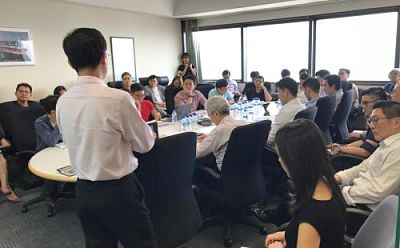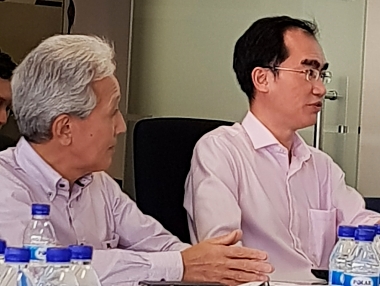|
For Uni-Asia Group, 2018 was a story of a very good valuation gain on its property investments and a very awful loss for its ships.
|
||||||||||||||||||
 CFO Lim Kai Ching at FY18 results briefing.
CFO Lim Kai Ching at FY18 results briefing.
Photo by Colin LumUni-Asia said the special dividend is derived from its gain from its second HK commercial property development project -- at 650, Cheung Sha Wan Road.
|
Stock price |
$1.22 |
|
52-week |
$1.15 -$1.53 |
|
Market cap |
$57m |
|
PE (ttm) |
9 |
|
Dividend |
5.7% |
|
P/BV |
0.44 |
|
Data: Yahoo! |
|
In 2018, that very successful project returned to Uni-Asia the HK80 m investment that Uni-Asia sunk in plus a HK$80 m dividend.
That's not all, as some more proceeds will come this year, said Uni-Asia.
Uni-Asia has reinvested into Projects No.3, 4, 5 and 6 in 2018.
Strategically, they will be completed one after another in different years, ie, 2019, 2020, 2021 and 2022.
This sets up an annual flow of income for Uni-Asia.
The property investment segment yielded a fair value gain of US$9.3 million in 2018, following a US$6.8 million fair value gain in 2017. Executive chairman Michio Tanamoto and CFO Lim Kai Ching at the FY18 results briefing.
Executive chairman Michio Tanamoto and CFO Lim Kai Ching at the FY18 results briefing.
NextInsight photoThese gains, which ride on the buoyant commercial property market in HK, are a sharp contrast to the fair value loss on Uni-Asia's ships.
After recording a US$6.2 million fair value loss on its ships in 2017, Uni-Asia had another round of loss of US$9.2 million in 2018 -- for containerships and a disposed product tanker.
In addition, there was an impairment of US$3.0 million for a wholly-owned containership and a US$3.0 million provision for an onerous ship sale-and-leaseback contract.
The bright side is that its containership joint-investments have been written off completely.
(The word is "containerships". The numbing pain was there, a consequence of Trump's trade war).
Uni-Asia's dry bulk carriers are fine -- thanks to steady movement of commodities such as iron ore and grains.
And possibly in favour of Uni-Asia, the supply of certain types of dry bulk carriers will shrink because of a new environmental regulation, the IMO 2020 global sulphur cap.
| ♦ US$3.9 million net profit in 2018 | ||||||||||||||||||||
|
For more, see the FY18 results Powerpoint presentation materials here.






